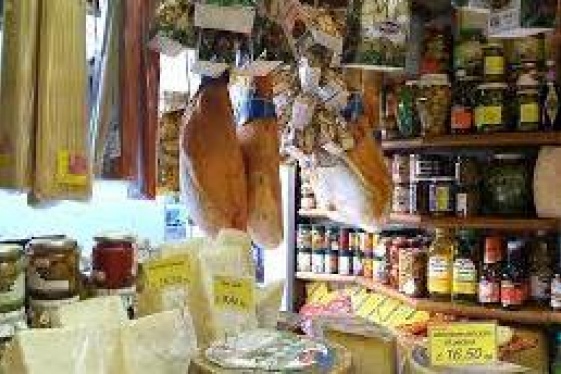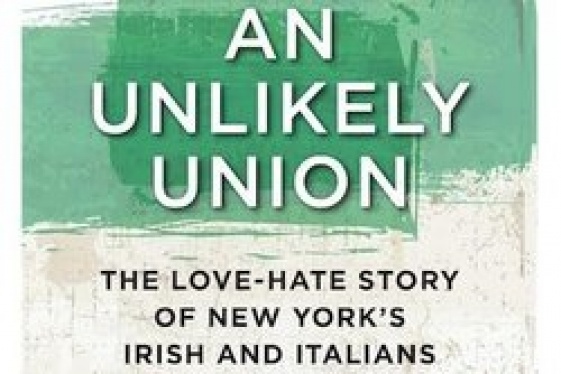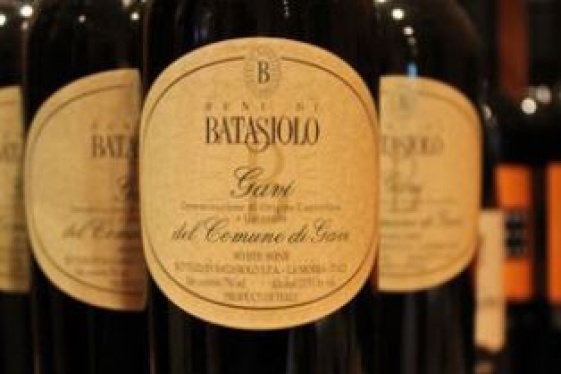
Rossella Rago (Cooking with nonna)
Cooking with Nonna: non solo cibo, protagonista è la famiglia italiana

When you think about the models of young Italian Americans in the show business world, you sadly end up admitting that the most famous are the shameful boys and girls of Jersey Shore. Those girls, in particular, gave a very bad message and this happens even if you switch to Italian American adult women characters in a few stupid reality show.
On the contrary, the Italian American community is full of young people and women who are a great example of smartness, dedication and success. One of them, a young, talented and beautiful girl, is the protagonist of the show "Cooking with Nonna" and of our interview today: Rossella Rago.
Rossella, first of all: what is "Cooking with Nonna", and how you came up with this winning idea?
Cooking with Nonna was born in my nonna's basement, in Brooklyn. I was studying at St. John's University to be an Italian teacher. I have a very theatrical background, my mother is a playwright and an actress, and I was an actress when I was younger and some of my family even suggested that I should go to an acting school. So one day, after dinner, my father asked me "what do you wanna do with your life"? And I said "I should have a cooking show". At that time I was living at my nonna's and I think that throughout my life I always absorbed from her lessons about how to cook ... it was a joke, and he said "ok, let's have a show, let's call it "Cooking with Nonna".
It was very funny, but then a week later he bought the web domain www.cookingwithnonna.com, and then he built a set with the stove where we cook on, and so we started filming episodes. We launched it in June 2009 and we have been very fortunate, because a year later we participated and won the Food Network show called "24 Hour Restaurant Battle" which brought a lot of attention. The show is about opening a restaurant in 24 hours and we won the competition against another team. My team was me, my mother Angela and my nonna Romana, and as my family is from Puglia, we opened a Pugliese Masseria in 24 hours: we were in a studio divided in two large spaces, each team had a budget and we had to create a concept, design the restaurant, shop for it, hire the staff, cook the food and serve it to 100 customers. From that on it's being a big success from a social marketing standpoint: we have more than 65,000 fans on facebook and it's very exciting. So now my father is my manager, I call him daddager!
We feel that your project is not only about cooking, but also about the importance of the older generations for the youngest ones: and in this, Italian families are at the top among the many different kind of families in the US of nowadays. Are we wrong?
No you're not. Actually, the show for me is not only about the food, but maybe most of all about the women and how amazing these nonne are, with all the things that they're gone through: often being a widow, emigrating to another country, not speaking the language ... unfortunately the Italian traditional culture and society are very patriarchal, where is not paid enough attention to women who take care of everyone and cook every single day and are the cornerstones of these families, somebody who you can always count on for a good advice ... my family says it all the time: "what would we do without nonna ...". They hold everybody together, they're professional chefs to me – my nonna has been cooking every single day for 68 years - and their perseverance is amazing and inspirational: they are dedicated to maintain the family traditions, no matter what. It's often said that people who came from another country didn't want to assimilate: but our nonne have done a remarkable job in assimilating, learning a new language, some of them made wonderful small business ... and still, they maintained their culture and their traditions. That's what I really love about Italian Americans. I myself have always felt too Italian for an American and too American for an Italian: and I was born here in the US, while both my nonna and my parents were born in Italy and then came to the US in the sixties.
I think that nonne are important also in other cultures who live here in the US: in the Jewish culture, for instance. But I think that a figure like the Italian nonna is something that has no comparison, in the US, outside of the Italian American community: even other friends of mine, first generation Italian Americans like me, agree on this.
Still, in the show you also cook with other nonne, right?
I cook with my nonna quite a bit, but yes, I've cooked with nonne from different Italian regions, working on recipes from their own region with typical local food. We stream the show on our website www.cookingwithnonna.com and we have a youtube channel where everybody can see the episodes.
Is there an anecdote, something funny that happened during the recording of your show and you want to share with our readers?
Oh, it happens all the time ... I could make a Fellini film with all those: I never know what I'm gonna get. One nonna came with a limousine, and she was so nervous that she needed limoncello to calm down: sometimes you have to get the woman a little drunk, and sometimes they don't start talking because they're scared. I enjoy all the personalities, and it's perfectly understandable: they're not used to be in front of a camera. A lot of them sleep at my house, because that's where we record the show, in two days.
The one anecdote I remember now is when I had a nonna who was a gambler, a high roller in Atlantic City. She came to do the show straight from there, and she told me right on the show "I just won 26,000 dollars, but don't tell anyone or I have to pay taxes". And the next morning just out of the bed she was wearing this night gown that said "NO SEX". That was funny!
How would you describe the relation between the young Italian Americans and the Italian cuisine? Are they still into the Italian dishes, or the tradition of good and healthy Italian cooking is something that is not so big among them?
Well, first of all you have to separate Italian cuisine from Italian American cuisine: there are things that I disagree with, definitively. There are places where they don't know how to cook Italian just because they have never seen the proper ingredients: it happened to me in Indianapolis with the "Orecchiette with Cime di Rapa", many of the people there had no idea what "cime di rapa" was.
Generally, when they don't recognize the Italian food, the problem comes from education: and sometimes, people tend to think that Italian American cuisine (chicken parmigiana, spaghetti with meatballs) actually is Italian cuisine. But we know that's not true and that's what we're trying to do in Cooking with Nonna: show the authentic Italian cuisine, just like they do at Eataly. So I feel that once young Italian Americans taste the real Italian food, they recognize it and of course they like it a lot.
What's the role of young Italian American women in the United States of the XXI century?
I think our role is absolutely different from the one our mothers and grandmothers had when they came here. In my case, and I have a lot of girlfriends in the same situation, I am the first generation going to college, with every opportunity afforded by my family. Today young Italian American women have different opportunities, choices to make: we will still always be wives, and mothers, and take care of our families and our homes, but we can do so much more. I will always be an Italian woman, first: family, values, home will never be forgotten. But I'm also a professional who's college educated, willing to profit from the opportunities that have been afforded to me: and it's the same for a lot of my Italian American female friends, with the same values and the same background, but also the same commitment to have a career and be successful. And being a part of the wonderful Italian culture, having the possibility to be part of our heritage and what it represents for us, is something that helps us in doing so: because no matter the differences about the region we come from, the social divide, our education or where we live in the US, we are all Italians and this will never end. I've never really seen something like that with other cultures here in America.
America has just spent the most important day of the year for cooking and eating in the families: Thanksgiving. Is that an Italian cooking way of Thanksgiving, or it's impossible to mix up the two traditions?
I remember when I grew up watching all the commercials talking about turkey, sweet potatoes, mash potatoes ... I would say "Oh my God, my house is so different" ... because we all had those things, but before them we always ate pasta, lasagna, typical Italian food ... and so, when was turkey time, we were full, not hungry anymore! We can say that we had it for decoration ... that was our Italian thanksgiving, and it still is nowadays. I know Italian families that celebrate it in the American way, but just one or two: all the others do like us, it basically is just a big Italian meal.
In conclusion, what's your favorite Italian dish? And have you got one personalized by you?
My favorite Italian dish is Parmigiana, Eggplant Parmigiana.
One that I personally updated is a dessert recipe. At Christmas we always make Cartellate from Puglia: the traditions says that it is a pastry dough shaped into a rose, fried and dipped in vin cotto. From the traditional Cartellate I made "Cartellate di Primavera" (Spring Cartellate): they are squares of the pastry dough, fried and served like a sandwich with olive oil gelato between two squares, and a drizzle of vin cotto on top.
You may be interested
-
‘Fuggedaboudit’ the motto of new Italian del...
By Kimberly Sutton Love is what brought Tony Nicoletta to Texas from New York.The transpl...
-
1st Annual Little Italy Cannoli Tournament
Little Italy San Jose will be hosting a single elimination Cannoli tournament to coincide...
-
A Week in Emilia Romagna: An Italian Atmosp...
The Wine Consortium of Romagna, together with Consulate General of Italy in Boston, the Ho...
-
An Italian American Feast For Family Reunion...
Hey, come over here, kid, learn something. ... You see, you start out with a little bit of...
-
An Unlikely Union: The love-hate story of Ne...
Award-winning author and Brooklynite Paul Moses is back with a historic yet dazzling sto...
-
Buon Appetito! Unique Italian dining at Ragú...
There's something to be said for having your food prepared tableside. Guacamole tastes fre...
-
Cathedral of St. John the Divine, Oratorio S...
For the first time ever, The Cathedral of St. John the Divine, in collaboration with the O...
-
Chef Carmelo Mauro to host Beni Batasiolo Wi...
Fiorenzo Dogliani, owner of Beni di Batasiolo, will join Carmelo Mauro for an exclusive wi...












